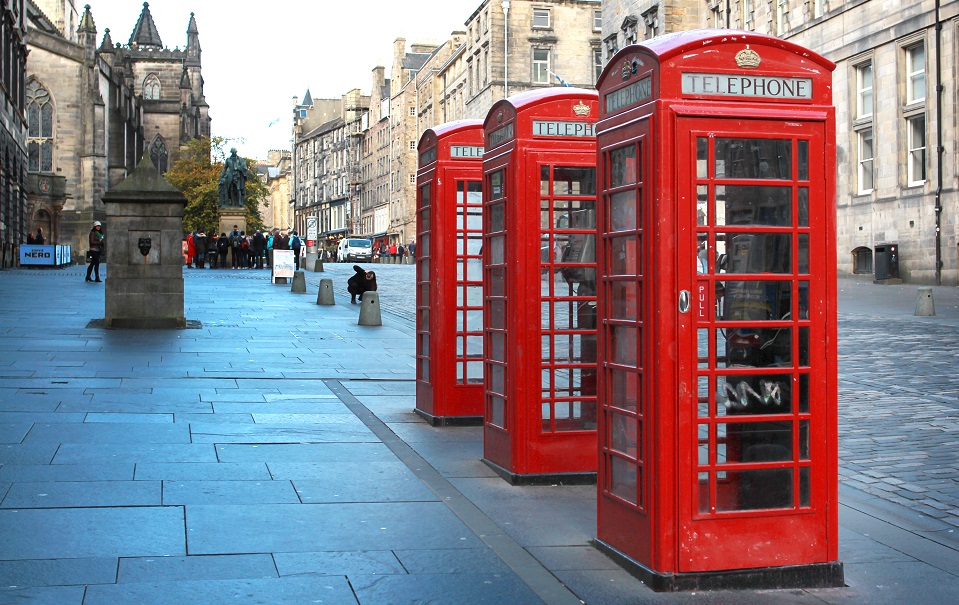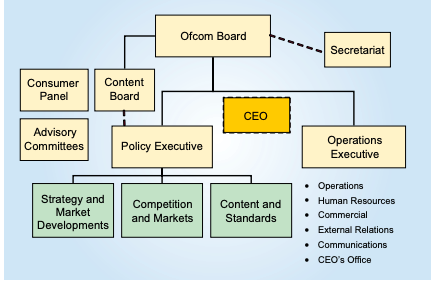We discuss the following topics in this blog:
- What is Ofcom?
- What does Ofcom do?
- History of Ofcom
- Functioning of Ofcom
- Ofcom Regulations
- Complaining to Ofcom
In addition to these topics, we shall also be answering the following FAQs:
- What is Ofcom responsible for?
- What happens when you complain to Ofcom?
- Does the Government own Ofcom?
- What does Ofcom not do?
- What does Ofcom mean?
- Why does the UK need Ofcom?
- Why is Ofcom important?

Contents
Overview
The UK in the late 1990s saw a rapid technological disruption that was meant to transform the broadcasting and telecommunications industry forever. However, the existing systems at the time weren’t suitable enough to accommodate all the stakeholders, including service providers and the customers. As a result, Ofcom, a statutory body, was introduced to execute the desired transition. The history of Ofcom reveals how Ofcom has been consistent with its progress in serving the public. The lawmakers, time and time again, have put faith in Ofcom’s ecosystem. They have entitled them to new roles and legal powers to grow the UK’s communication service industry.
What is Ofcom?
The Office of Communications (Ofcom) is the UK’s statutory corporation which acts as a regulatory body for broadcasting, telecommunications, and postal services. The Parliament defines the consumer-centric Ofcom duties. The responsibility is to provide the people of the UK with exemplary experience of using broadband, phone or mobile services, TV and radio, on-demand video, universal postal services, and also to look after the airwaves which are essential for the functioning of wireless devices such as cordless phones, doorbells, and walkie talkies. The Ofcom UK regulates nearly all the communication services which people rely on every single day. If you are wondering, how is Ofcom funded? Being an independent body, it is funded by the fees paid by the companies they choose to regulate. Another aspect of Ofcom’s work includes ensuring that everybody across the UK is satisfied by what they watch and hear on TV or radio sets daily.
Ofcom is also a platform for the public and businesses to file complaints against their communication service providers or broadcasting firms. Ofcom educates the public about their rights as consumers of communication services and the bad practices or scams for safety purposes. Ofcom makes investigations against the accused company, and at times they find them as culprits based on the evidence of a violation of rules put in force by Ofcom. Every single complaint made by any viewer or listener is never left unanswered, which reflects the unwavering commitment of Ofcom towards the people of the UK. On the other hand, Ofcom also nourishes a healthy competition between the broadcasting companies they regulate to ensure high-quality communication and postal services are provided to the people.
What does Ofcom do?
The workings or roles and responsibilities of Ofcom are well defined, and every citizen, especially in the present digital age, should be aware of what Ofcom does and how they can seek help when needed. However, there are limits to the discretionary powers of Ofcom, but still, they make a profound impact by making things easier for the people of the UK.
The Ofcom makes sure of the following tasks:
- People across the UK can use all kinds of communication services, including broadband.
- All the companies regulated under Ofcom’s guidelines serve the people by designing television and radio shows that can appeal to different sets of audiences.
- Ensuring the restriction of harmful or offensive content to protect viewers and listeners on all the major platforms – TV, radio, and on-demand.
- Prevention of privacy invasion and unfair treatment in programmes.
- Coverage of all the UK addresses by universal postal service for six days a week on standard pricing.
- Looking after the effective ways to achieve impeccable utility of radio spectrum in the UK
What Ofcom doesn’t do is also worth noting because people tend to make assumptions about Ofcom, leading to misinformation.
A list of operations or formalities which don’t come under the purview of Ofcom:
- Ofcom doesn’t have the authority to handle individual disputes between the customer and the service provider. However, such disputes are to be dealt with via the ADR (Alternative Dispute Resolution) scheme.
- The premium-rate telephone services are regulated by the Phone-paid Services Authority and not by Ofcom.
- The advertising standards for TV, radio, or the internet.
- The BBC licence fee
- The BBC world service
- Content published in newspapers or magazines
- Control over what people can or can’t write or post on the internet.
History of Ofcom
Ofcom was established under the Office of Communications Act 2002. After the general election of 1997, the new Labour Government made plans for the regulation of both telecom and broadcasting. It was clear at the time that the incorporation of Ofcom was a defining step taken to manage the euphoric acceleration of broadcasting and telecommunication technologies. The convergence was needed to look after the increased competition and the diversity it fuelled into the media industry.
The Ofcom was empowered by the Communication Act, 2003, to take over the functioning of five different bodies. The five entities were – Broadcasting Standards Commission, Independent Television Commission, the Radio Authority, Radio communications Agency, and the Office for Telecommunications (OFTEL.) The Act, which empowered Ofcom, brought a new vision that overnight changed the nature of the UK’s telecom industry.
The landmark changes in the broadcasting and telecommunications industry since the inception of Ofcom:
- The historic licencing system was replaced with companies now operating under ‘general conditions of entitlement.’
- In September 2009, Ofcom proposed how two bodies can regulate the aspects of video-on-demand services on their behalf. Effective from March 2010, the Association for Television on Demand (ATVOD) is now the co-regulator for the editorial content. The Advertising Standards Authority (ASA) is now the co-regulator for advertising content.
- In April 2010, the new legislation passed the Digital Economy Act, which did have the Royal Assent, which resulted in the expansion of Ofcom’s role in the concerned industry. The 2010 Act demanded an Ofcom report on media content and communications infrastructure and was also given the additional powers related to electromagnetic spectrum access.
- In 2011, Ofcom officially received control of the regulation of the postal services from Postcomm. Another herculean job of safeguarding the UK’s Universal Service Obligation on postal services was onboarded by Ofcom.
- In April 2015, Ofcom’s decision to ask telecom companies to provide its customers with a defined charge for the cost of calling numbers that begin with 084,087 and 09 impacted over 175 million phone numbers. The largest overhaul was recorded in over a decade of telephone services.
- In 2016, the on-demand video regulation was transferred back to Ofcom from ATVOD.
- The 2017 Digital Economy Act focused on Ofcom’s extension by providing additional powers related to minimum broadband speeds of service providers along with the permission to control children’s programming provisions. It also empowered Ofcom with the authority of charging CSPs with fines for not complying with the licence commitments. The same act also allowed Ofcom to take regulation control of the BBC from the BBC Trust.

The history of Ofcom clearly showcases the trust lawmakers have put in them over the last two decades.
Functioning of Ofcom
An organization like Ofcom can be seen as a generalist, but it has multidimensional roles to play and needs responsible staff and leadership to keep things running.
The main decision-making body for Ofcom is its Board which designs the strategic directions to be followed by the entire organization. Multiple Boards and Committees are involved in managing Ofcom nationwide and in developed nations.
Ofcom’s Board:
The Board consists of a Non-Executive Chair, Executive Directors, and Non-Executive Directors. It is the Executive who runs the organization and is answerable to the Board. A monthly meeting is held of all the Board members to discuss agendas concerning Ofcom. All the notes and minutes of the meeting are made available on the official website – https://www.ofcom.org.uk/.

Source: EBU Technical Review
Functions and Role of Ofcom Board:
The Board is the main statutory instrument that has the fundamental role of implementing the Communications Act 2003. The functioning of Ofcom does not follow the traditional methods of historical broadcasting or telecommunications regulatory regimes. The governance structure followed here is of the commercial sector.
The Board exercises central governance to ensure the organization is meeting all the general and statutory duties. Apart from overseeing the funding and expenditure of Ofcom, the Board makes conscious efforts that Ofcom complies with the ethos like every other public service organization. The Board promotes collective responsibility and has agreed to abide by the principles introduced for healthy functioning. These principles focus on the following aspects:
- Access to all the information to all the members for effective decision making
- Accountability of nominated Board members over specific decisions
- Under all circumstances, all Board members will have to agree with all decisions
- The Board processes will not be affected by external pressure except for potential timelines
- The minority views will not make it to the public eye and internally
- It is expected that each member’s response to all the decisions made or agreed upon will be the same internally and externally
- Under no circumstances, none any of the Board members have the right to publicly rehearse the arguments of their fellow members, especially in cases of resignation or internal disagreements
Ofcom Regulations
Regulation of Broadcasting
Ofcom’s broadcasting regulation includes the following aspects:
- Content
- Competition
- Media ownership
- Media Literacy
- Spectrum management
The content regulation of television and radio is defined within three “tiers”:
Tier 1: Look after the negative content regulation. The priority is to cover matters concerning privacy, offence, harm, impartiality, and fairness.
Tier 2: Concerns regarding quantitative matters. A brief example would be ensuring reasonable quotas for independent productions, regional production houses, and original UK productions.
Tier 3: Concerns with public service broadcasters, mainly for ITV, Channel 4 and 5.
Telecom Regulations by Ofcom
The existing regulation of Ofcom includes market reviews and charge controls pertaining to mobile call termination, Ethernet and leased lines, broadband access, residential and business narrowband, and fixed telephony.
The four core aspects of telecom regulations:
- General conditions of entitlement: Regulatory conditions put in place for all the CSPs if they want to provide communication services. Revised general conditions were applicable from October 1, 2018. General conditions can be summed up in three categories:
- network functioning conditions
- numbering and other technical conditions
- consumer protection conditions
- Ethernet and leased lines: The current regulation in place is Wholesale Fixed Telecoms Market Review 2021-26.
- Mobile termination: It includes the market review of the wholesale service given by a mobile communications provider for connecting a call on its network to a recipient.
- SMP (Significant Market Power) guidelines: SMP guidelines are based on Oftel’s market review guidelines.
Complaining to Ofcom
The filing of complaints by customers to seek redressal is an integral part of Ofcom’s ecosystem. Anybody can lodge their complaints on the official website. Ofcom has divided the complaint filing process into five categories:
- Complain about mobile, phone or internet services
- Complain about TV, radio or on-demand services
- Complain about postal services
- Complain about wireless interference
- Complain about a video-sharing platform (VSP)
The process of filing a complaint is efficiently customized for a hassle-free experience. There are further bifurcations under these five categories. People can also submit complaints via phone calls and by posting emails.
Ofcom dealt with 34,545 complaints in the year 2019-20. The goal is to respond within 15 days. The regulator disclosed how 3,622 complaints related to130 different cases contributed substantively, and orders were given for further investigations. Later, 79 were found to be in breach of Ofcom’s code.
FAQs
What is Ofcom responsible for?
Ofcom is an independent statutory body established under the Communications Act, 2003 to regulate TV, radio, fixed-line telecoms, on-demand video, postal services, and the airwaves needed for the operation of wireless devices. It is also known for investigating the complaints registered by customers against the communication service providers.
What happens when you complain to Ofcom?
Each complaint filed is vigorously examined to see if any rules were violated. If Ofcom doesn’t find any discrepancies, the case will be closed, and a record of the same will be published on their Broadcast and On-demand Bulletin within 15 days. However, if the case requires further investigation and the accusations become substantive, then strict actions are taken. In the past, many CSPs were fined heavily for violating the code of Ofcom.
Does the Government own Ofcom?
Being a statutory corporation, Ofcom’s functioning is independent of Government, but it works with the Department for Digital, Culture, Media, and Sport (DCMS.) And the Secretary of State is expected to present the Parliament with the Ofcom’s annual report. The National Audit Office is also subjected to inspections and is held accountable before the Public Accounts Committee.
What does Ofcom not do?
It can’t handle individual disputes between a customer and a service provider. Among other things, it also can’t define advertising standards for any of the mediums. Ofcom doesn’t regulate newspapers and magazines and can’t control what people write or post on the web. Despite being a major regulator, it can’t regulate premium-rate telephone services and have no control over post offices as well.
What does Ofcom mean?
Office of Communications: an independent statutory body which the Parliament empowers for the regulation of telecommunication and broadcasting industries; and also, as a super-regulator by merging of Radio Authority, Independent Television Commission, and Oftel.
Why does the UK need Ofcom?
Ofcom was born out of the fact that both technological and market developments were rapidly dissolving the margins between telecommunications and broadcasting. Thus, it was time to introduce a dynamic setup like Ofcom, which could impact all the areas of the communications service industry, be it radio, television, spectrum management or postal services.
Why is Ofcom important?
The role of Ofcom is quite critical as it not only regulates the entire communication service industry but also serves as a healthy partner and a mediator between the service providers and its customers. Promoting healthy competition to ensure each customer is served beyond expectations and is provided justice if any wrongdoing occurs portrays the importance of an organization like Ofcom.













